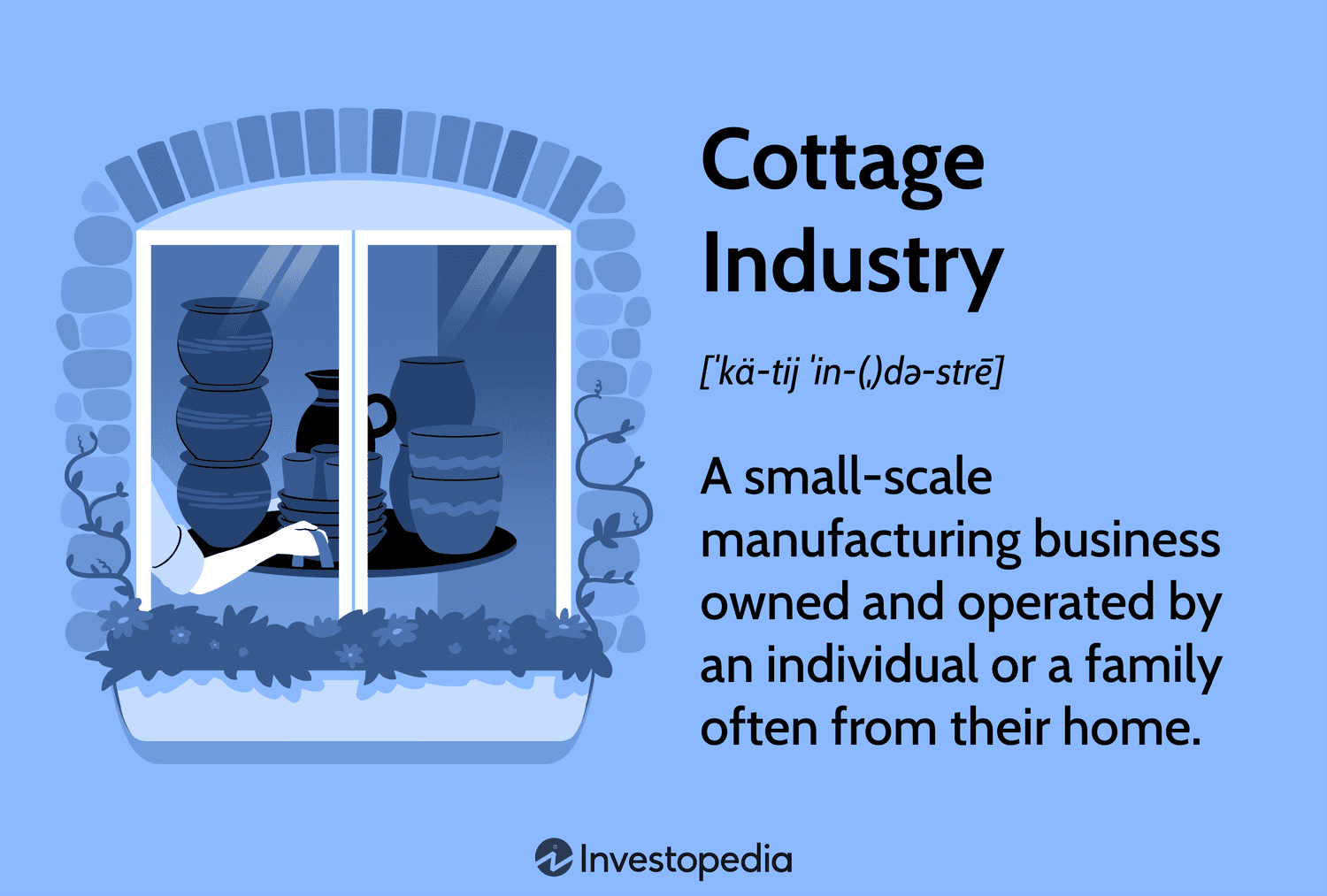Introduction
In the realm of economic ecosystems, the concept of cottage industry holds a unique charm, embodying resilience, creativity, and community spirit. This article aims to delve deep into the cottage industry definition, exploring its historical roots, contemporary relevance, and future prospects. Join me on this journey as we uncover the intricacies of this fascinating economic phenomenon.
Understanding Cottage Industry
Defining Cottage Industry
The term “cottage industry” encapsulates small-scale, decentralized production units typically operated from homes or small workshops. These enterprises engage in the production of goods or services, often utilizing traditional methods and employing family members or a small group of individuals.Cottage Industry Definition
Evolution of Cottage Industry
Tracing back to medieval Europe, cottage industries flourished as a means of supplementing agricultural incomes during lean seasons. Artisans crafted goods such as textiles, pottery, and handicrafts within their cottages, laying the groundwork for the industrial revolution.
Impact on Industrial Revolution
The cottage industry played a pivotal role in the transition from agrarian economies to industrialized societies. It served as a precursor to mechanized production, fostering innovation, and serving as a breeding ground for entrepreneurial spirit.
Characteristics of Cottage Industries
- Small-scale Operations: Cottage industries are characterized by modest production capacities, often catering to niche markets.
- Localized Production: Production units are typically situated within communities, fostering a sense of local identity and cultural heritage.
- Flexibility and Adaptability: These enterprises exhibit agility in responding to market demands, leveraging personalized customer experiences.
- Traditional Craftsmanship: Many cottage industries preserve traditional craftsmanship, ensuring the continuity of cultural heritage and artisanal skills.
Significance in Modern Context
Resurgence of Cottage Industries
In recent years, there has been a resurgence of interest in cottage industries, fueled by consumer preferences for ethically sourced, artisanal products. This resurgence is not merely nostalgic but reflects a conscious choice to support sustainable, community-based enterprises.
Role in Economic Empowerment
Cottage industries play a vital role in empowering marginalized communities, providing avenues for income generation and skill development. By decentralizing production, they contribute to economic inclusivity and reduce dependence on centralized industries.
Empowering Women Entrepreneurs
Women, in particular, have found empowerment through cottage industries, as these enterprises offer flexible work arrangements conducive to balancing familial responsibilities.
Challenges and Opportunities
Market Integration
While cottage industries offer numerous advantages, they face challenges in scaling up and integrating into global markets. Lack of access to capital, limited technological infrastructure, and regulatory barriers can impede their growth trajectory.
Harnessing Technology
Embracing digital technologies can enhance the competitiveness of cottage industries, enabling them to reach broader markets and streamline operations. E-commerce platforms, digital marketing strategies, and online payment systems open new vistas of opportunity for these enterprises.
Sustainability Imperative
In an era marked by environmental consciousness, sustainability has emerged as a critical imperative for cottage industries. Adopting eco-friendly practices, sourcing ethically produced raw materials, and minimizing carbon footprints are essential steps toward ensuring long-term viability.
Future Outlook
Innovation and Adaptation
The future of cottage industries lies in innovation and adaptation, as these enterprises navigate evolving consumer preferences and market dynamics. Embracing sustainable practices, leveraging digital technologies, and fostering collaborative networks will be key drivers of growth.
Preserving Cultural Heritage
As custodians of traditional craftsmanship and cultural heritage, cottage industries have a pivotal role in preserving intangible cultural assets. By celebrating indigenous knowledge and artisanal skills, these enterprises contribute to the enrichment of global cultural tapestry.
FAQs (Frequently Asked Questions)
- What is the primary characteristic of cottage industries? Cottage industries are characterized by small-scale, decentralized production units typically operated from homes or small workshops.
- How do cottage industries contribute to economic empowerment? Cottage industries empower marginalized communities by providing avenues for income generation and skill development.
- What are the challenges faced by cottage industries in modern times? Cottage industries face challenges in scaling up, accessing capital, integrating into global markets, and adopting sustainable practices.
- Why is sustainability important for cottage industries? Sustainability is crucial for cottage industries to ensure long-term viability, minimize environmental impact, and meet consumer demands for eco-friendly products.
- How can cottage industries harness digital technologies for growth? Cottage industries can leverage e-commerce platforms, digital marketing strategies, and online payment systems to reach broader markets and streamline operations.
- What role do cottage industries play in preserving cultural heritage? Cottage industries serve as custodians of traditional craftsmanship and cultural heritage, celebrating indigenous knowledge and artisanal skills.
Conclusion
In conclusion, the cottage industry definition encompasses more than just economic activities; it embodies a way of life rooted in creativity, community, and sustainability. As we navigate the complexities of the modern economy, let us not forget the enduring legacy of cottage industries and the invaluable contributions they make to our shared heritage.


